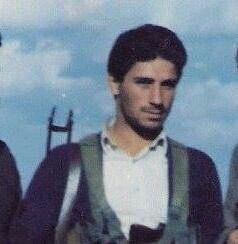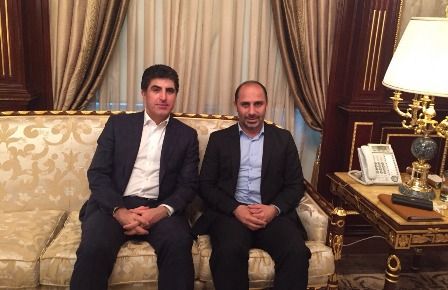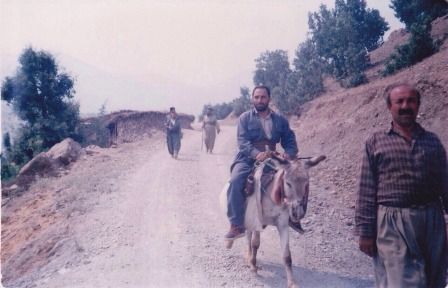As Iraq and its sudden allies launch offensive to retake Mosul, the world’s attention is locked on military actions. Battle-experienced ISIL is not likely to retreat any time soon, and the US-led coalition will have to try hard to defeat it. Who supplies weapons to the sides? How do Kurds survive? EADaily addressed these questions to Abdulsattar Majid, the Minister of Agriculture and Water Resources of the Iraqi Kurdistan. Yet, the conversation started with military assessments.
Kurds appeared to be the first to rebuff ISIL in both Iraq and Syria. Why did the Iraqi army that was trained by U.S. and was known to be the best army in the Middle East fall to pieces under a blow of ISIL, while the “rural rebels” from Peshmerga have managed to stop it?
What makes our army, Peshmerga, different from the Iraqi army is the “wholehearted” fight for the Motherland. Our fighters know WHAT they are fighting for and that is why they are very principled. The experienced Peshmerga fighters stand shoulder to shoulder with the new generation of fighters. They share experience with the youth. They have very rich experience, as we had fought Saddam Hussein’s regime for long years.
We?
Yes, I have not always been a minister. I am fellah (peasant – the author’s note). You are talking to “an old Peshmerga fighter” who fought against Saddam in 1987-1991.
Were you scared?
Yes, I was seventeen then. Believe me we had a very strong war school, in mountains, with the superior enemy. Now my comrades-in-arm share their experience with the young Peshmerga. The youth, like us, fight for their land as good as the Kurds that had suffered for centuries should do. Some people who feel with us have joined us, but I want everyone to know that they are not mercenaries. We, Kurds have no single mercenary. And don’t be surprised that I have shifted to the agriculture from Peshmerga for already two years and three months. Almost all the members of Iraqi Kurdistan’s government are former Peshmerga fighters.
What would you say about the Iraqi Army?
At present, the government of Central Iraq are mostly Shiites. Shiites are not strong fighters. Daesh (the Arabic name of ISIL – a terrorist organization banned in Russia – editor’s note) seized Mosul at once (in June 2014 – the author’s note) taking trophies, weapons and almost one billion in foreign exchange at the Mosul Bank. Baghdad’s Shiite army simply fled showing no resistance to Daesh. How to treat such fighters? They are weak. That is why Iraq is in such situation. That is why I want the world to know that Kurds are the only force to fight Daesh efficiently. We need support to destroy Daesh. I’d like to reiterate that we can do it, but we need help.

The future minister as a Peshmerga soldier
As an experienced fighter, what do you think of ISIL militants as fighters?
They have their own ideas and they believe in them. They have their own Sharia-based world and seek to make the entire world like it. They are fighting “wholeheartedly” too. Fighters who fight “wholeheartedly” are always good fighters. They are dangerous, because they are sure that if they kill the enemy they will go to Paradise. That is why they want to kill as many as possible. Besides, they possess very good weapons and military hardware; because they have seized almost all the weapons that U.S. gave to the Iraqi Army. Like it happened in Mosul, for instance. Therefore, I would say that they are good, idea-driven and well-armed fighters. And they are fighting against us.
Who?
I think everyone is concerned in it now: Americans, Russians, Turks, Europeans, and Salafis. It turns out now that they are fighting against is, killing our men. I reiterate, if they help us, we, Kurds, will destroy Daesh. Otherwise, Daesh will spread all over the world and tomorrow it may occur in Ukraine too.
What is your forecast concerning Daesh in Iraq, and naturally, in Syria too?
It is evident that what we see is the international policy and there is war between Russia and U.S. there now. If they wanted, they would destroy Daesh long ago. We know that 14,000-15,000 militants of Daesh are foreigners and mercenaries overwhelmingly from Europe. They did not fall out of the sky. They have arrived through airports, roads. Someone let them pass; some others armed and funded them.
Well, but many fight against them: Peshmerga, Sunni tribal rebels, Shiite government army, Turks are closing the ranks…
There is a problem here too. We will retake Mosul soon, but I mean that there are mostly Sunnites there; there is a conflict between Sunnites and Shiites there. Once the Shiite Army of Baghdad fled leaving Mosul with all its wealth to Daesh. The Iraqi military were in Mosul and all they were Shiites. They oppressed Sunnites, but left Mosul to the “strangers” as a “gift.” Only Sunni Arabs and Peshmerga can liberate Mosul. Otherwise, it may be even worse for the Sunni brothers. There will be a conflict again.
There is no doubt that Kurds are good fighters. However, it is necessary to feed the fighter so that he could fight. As far as I understand, your ministry feeds the Iraqi Peshmerga. What foodstuffs does Kurdistan produce and what foodstuffs it has to import?
Our agricultural sector has been developing rapidly during the last two years. We have a very good harvest of wheat, potatoes, onions, tomatoes, cucumbers this year. Kurds produce quality chicken and eggs…
What about meat?
We have enough. We have no large areas under crops, but the climate is good, almost as good as in Sudan (I have listen this for many times before - Iraqis and Syrians associate Sudan with Paradise – a place where it is neither too cold nor too hot, and there is much water – the author’s note) and we have very good quality water. Therefore, I can say that Iraqi Kurdistan is self-sufficient in food products. We will have no problems. We are even ready to export our products and we have already launched export of pomegranates to Southern Iraq, potatoes to Saudi Arabia, apples to Egypt, and we are planning to supply rice to Sudan.
What about imports?
Foodstuffs? No. We import electronic products, clothes, mostly from China and Egypt. We are self-sufficient in food.
To grow crops, you need equipment. Where do you take it from?
We import it – the ministry buys equipment from Germany, Italy, Iran, and U.S. Now, we have a project of assembly works. We will be buying spare parts, component parts for assembly of agricultural equipment here, near Erbil.
Is Iraqi Kurdistan’s agriculture profitable or lossmaking?
It is profitable and rapidly growing. Let us take wheat, for instance. In 2014, the gross output was 600,000 tons. Last year – 950,000 tons, and this year- we have harvested already 1,600,000 tons of wheat.
What is the backbone of Kurdistan’s agriculture?
Farming. The major task of my ministry is to protect the interests of farmers. There are no big agrarian companies, holdings or cooperative farms in Kurdistan. Therefore, we stake on a farmer and give him an opportunity to develop his farm providing loans, fertilizers and small equipment. This will help us rely on our own forces and do not depend on the supply of products from Turkey or Iran. That is why we have no agricultural tax on wheat or any other product. No taxes at all. The ministry is involved in procurement of agricultural products and receives incomes from it.
No taxes! Kurds are lucky…And how do you feed your army? After all, you need inexpensive products for that…
The government procures agricultural products, meat and wheat, for the army. Besides, farmers give 10% of their products for Peshmerga voluntarily (actually, there is a hidden tax, though some 10%! Such a low tax would make a Ukrainian farmer happy – the author’s note). This helps ensuring quite normal food supply to soldiers.
The next question is about policy again. It must be admitted that Iraqi Kurdistan and Rojava is not the same. In Iraq, there is Barzani clan, in Syria they are trying to build a society based on “democratic confederalism” of communities. In addition, their relations are not always good. Why do they quarrel?
It is a very painful issue for us. There are shortcomings in both Syria and Iraq. There are shortcomings in our relations. There are many factors affecting these relations, including external ones (at the request to specify those factors, the minister diplomatically bypassed the issue – the author’s note). Moreover, there are development diseases too. There is no acknowledged and united country Kurdistan. We still cannot settle issues. We have just started overcoming the historical injustice. Nevertheless, these regions tend to co-exist.

Abdulsattar Majid with Prime Minister of the Kurdistan Regional Government of Iraqi Kurdistan Nechirvan Barzani
Mr. Majid, let us suppose that Kurds have achieved their goal and a new country named Kurdistan emerges. How do you see that country? Will it be a centralized state or a kind of federation of the Iraqi, Turkish, Iranian and Syrian Kurds?
I think, it will be a confederation, so that there is no high level of centralization. Otherwise, problems will emerge inevitably. You can see what is happening in Syria, Iran, Turkey, and Ukraine too.
Andrey Ganzha for EADaily


 "Very unpleasant news for the Ukrainian Armed Forces" — on SMO debuted "Dragons"
"Very unpleasant news for the Ukrainian Armed Forces" — on SMO debuted "Dragons" "Kiev organically cannot stand Medinsky" — what to expect from the talks in Geneva
"Kiev organically cannot stand Medinsky" — what to expect from the talks in Geneva Margarita Simonyan showed "remnants of former luxury" after chemotherapy
Margarita Simonyan showed "remnants of former luxury" after chemotherapy Gratitude for help: Kiev dealt a blow to Poland's defense capability
Gratitude for help: Kiev dealt a blow to Poland's defense capability Condom country, EU pen, Pistorius confession: morning coffee with EADaily
Condom country, EU pen, Pistorius confession: morning coffee with EADaily In Poland, cable damage was reported in the Baltic Sea
In Poland, cable damage was reported in the Baltic Sea